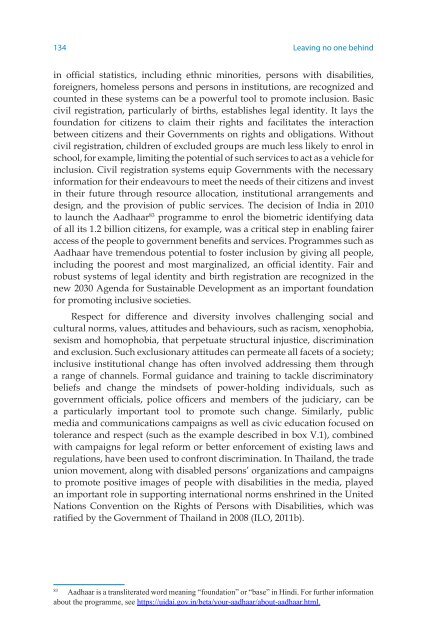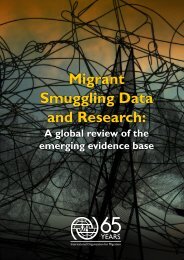Leaving no one behind the imperative of inclusive development
full-report
full-report
You also want an ePaper? Increase the reach of your titles
YUMPU automatically turns print PDFs into web optimized ePapers that Google loves.
134<br />
<strong>Leaving</strong> <strong>no</strong> <strong>one</strong> <strong>behind</strong><br />
in <strong>of</strong>ficial statistics, including ethnic mi<strong>no</strong>rities, persons with disabilities,<br />
foreigners, homeless persons and persons in institutions, are recognized and<br />
counted in <strong>the</strong>se systems can be a powerful tool to promote inclusion. Basic<br />
civil registration, particularly <strong>of</strong> births, establishes legal identity. It lays <strong>the</strong><br />
foundation for citizens to claim <strong>the</strong>ir rights and facilitates <strong>the</strong> interaction<br />
between citizens and <strong>the</strong>ir Governments on rights and obligations. Without<br />
civil registration, children <strong>of</strong> excluded groups are much less likely to enrol in<br />
school, for example, limiting <strong>the</strong> potential <strong>of</strong> such services to act as a vehicle for<br />
inclusion. Civil registration systems equip Governments with <strong>the</strong> necessary<br />
information for <strong>the</strong>ir endeavours to meet <strong>the</strong> needs <strong>of</strong> <strong>the</strong>ir citizens and invest<br />
in <strong>the</strong>ir future through resource allocation, institutional arrangements and<br />
design, and <strong>the</strong> provision <strong>of</strong> public services. The decision <strong>of</strong> India in 2010<br />
to launch <strong>the</strong> Aadhaar 83 programme to enrol <strong>the</strong> biometric identifying data<br />
<strong>of</strong> all its 1.2 billion citizens, for example, was a critical step in enabling fairer<br />
access <strong>of</strong> <strong>the</strong> people to government benefits and services. Programmes such as<br />
Aadhaar have tremendous potential to foster inclusion by giving all people,<br />
including <strong>the</strong> poorest and most marginalized, an <strong>of</strong>ficial identity. Fair and<br />
robust systems <strong>of</strong> legal identity and birth registration are recognized in <strong>the</strong><br />
new 2030 Agenda for Sustainable Development as an important foundation<br />
for promoting <strong>inclusive</strong> societies.<br />
Respect for difference and diversity involves challenging social and<br />
cultural <strong>no</strong>rms, values, attitudes and behaviours, such as racism, xe<strong>no</strong>phobia,<br />
sexism and homophobia, that perpetuate structural injustice, discrimination<br />
and exclusion. Such exclusionary attitudes can permeate all facets <strong>of</strong> a society;<br />
<strong>inclusive</strong> institutional change has <strong>of</strong>ten involved addressing <strong>the</strong>m through<br />
a range <strong>of</strong> channels. Formal guidance and training to tackle discriminatory<br />
beliefs and change <strong>the</strong> mindsets <strong>of</strong> power-holding individuals, such as<br />
government <strong>of</strong>ficials, police <strong>of</strong>ficers and members <strong>of</strong> <strong>the</strong> judiciary, can be<br />
a particularly important tool to promote such change. Similarly, public<br />
media and communications campaigns as well as civic education focused on<br />
tolerance and respect (such as <strong>the</strong> example described in box V.1), combined<br />
with campaigns for legal reform or better enforcement <strong>of</strong> existing laws and<br />
regulations, have been used to confront discrimination. In Thailand, <strong>the</strong> trade<br />
union movement, along with disabled persons’ organizations and campaigns<br />
to promote positive images <strong>of</strong> people with disabilities in <strong>the</strong> media, played<br />
an important role in supporting international <strong>no</strong>rms enshrined in <strong>the</strong> United<br />
Nations Convention on <strong>the</strong> Rights <strong>of</strong> Persons with Disabilities, which was<br />
ratified by <strong>the</strong> Government <strong>of</strong> Thailand in 2008 (ILO, 2011b).<br />
83<br />
Aadhaar is a transliterated word meaning “foundation” or “base” in Hindi. For fur<strong>the</strong>r information<br />
about <strong>the</strong> programme, see https://uidai.gov.in/beta/your-aadhaar/about-aadhaar.html.
















